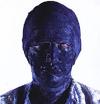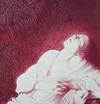Texts and Essays
Art News,New York – October 31, 1992
one-man show at Modernism Gallery, San Francisco
San Francisco, Gottfried Helnwein, Modernism
Gottfried Helnwein follows the lead of his older Viennese contemporaries
Arnulf Rainer and Hermann Nitsch in staging masquerades of suffering for
the camera. He is the principal performer in his tableaux, some of which
he translates from photograph into painting. Helnwein's first San
Francisco show at the Modernism, came well past the moment when art
seemed a fit vehicle for facile protestations of disgust at 20th-century
history, especially those twisted with irony.
Gottfried Helnwein follows the lead of his older Viennese contemporaries
Arnulf Rainer and Hermann Nitsch in staging masquerades of suffering for
the camera. He is the principal performer in his tableaux, some of which
he translates from photograph into painting. Helnwein's first San
Francisco show at the Modernism, came well past the moment when art
seemed a fit vehicle for facile protestations of disgust at 20th-century
history, especially those twisted with irony.
The psychic aftermath of the Third Reich in Austria and Europe is
one of Helnwein's ostensible preoccupations. His work implies that
historical amnesia continues the selective obviousness to others' sufferings
that made the Nazi nightmare possible. He has staged "actions" that
involve him sitting or lying prostrate in the Vienna streets, his entire head
swathed in bandages, to test the indifference of passer-by.
In many self-portraits he appears similarly bandaged, with forklike
or tonglike steel interments hocked over his eyelids or into his mouth. In
some pictures he reacts to these appurtenances as if they were torture
devices. In others he wears them with the air of a compliant patient.
Helnwein not only acknowledges that the self-display his work
entails, he even admits to a strategic interest in celebrity. His show
winkingly included huge close-up photo portraits of Andy Warhol, William
S. Burroughs, Charles Bukowski, Keith Richards, Arno Breker (Hitler's
favorite sculptor), and other notables.
In his painted-photo triptych called The Silent Glow of the
Avante-Garde (1986), Helnwein abutted two images, which show him
bandaged, bloodied, and becalmed, to a reproduction of an icon of German
pictorial Romanticism, Casper David Friedrich's shipwreck scene Sea of
Ice (ca. 1833-35).


